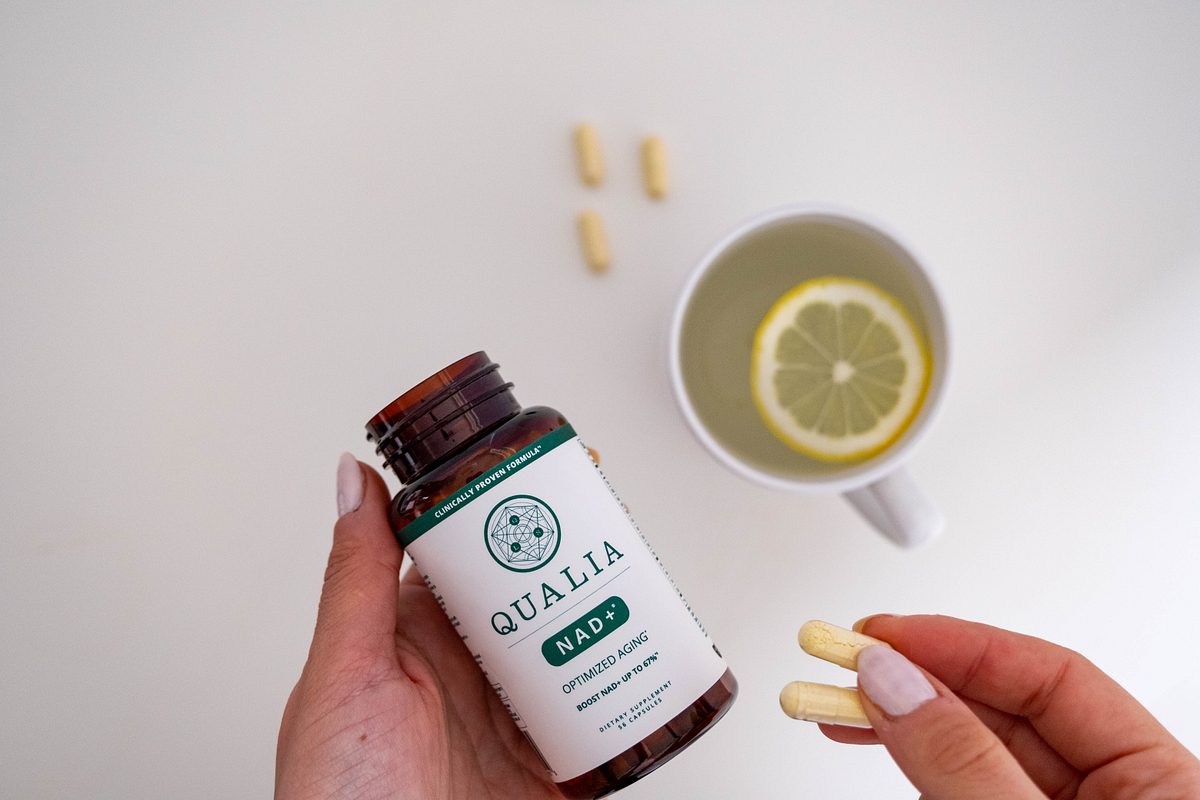Heart disease is the leading cause of death among women in the United States. In 2020, almost one in five deaths among women occurred from heart disease.1
Numerous factors contribute to this deadly condition, including high blood pressure, unhealthy cholesterol levels, smoking, carrying extra weight (especially around your midsection), and not exercising. The biggest impact on your heart health (and overall health), however, starts at the end of your fork.
Learn how to prevent or reverse heart disease in women in this episode.
The right foods, which combine the magic trifecta of protein, healthy fats, and fiber, keep your blood-sugar levels nice and steady for hours. Eating processed, high-sugar impact foods, on the other hand, create a risk factor for heart disease.
“Sugar can cause insulin resistance, which can lead to metabolic syndrome, a major cause of heart and vascular disease, and diabetes, a major cause of health problems that destroy quality of life,” says Vincent Pedre, MD, in Happy Gut.
Insulin Resistance, Inflammation, and Heart Disease
When you eat, say, a plate of spaghetti, the sugar in those carbs rushes into your bloodstream. The ensuing roller coaster of blood sugar spikes and crashes leaves you hungry (and not for things like Brussels sprouts), irritable, and craving more sugar.
High blood sugar takes its toll on your waistline, and it also increases your risk of heart disease. One review of 44 studies concluded that regulating blood-sugar levels was critical for heart health.2
Another study, with 18,990 men and women from 21 different countries, concluded that the risk of heart disease or premature death increases progressively for people with high blood sugar.3
When that meal elevates your blood-sugar levels, insulin swoops in to pull those levels back down. But consistently elevated blood sugar means your pancreas cranks out more insulin to compensate.4
“Insulin is the main cause of inflammation—now known to be the real driver of heart disease,” says Mark Hyman, MD, in Eat Fat, Get Thin.
Eventually, high blood sugar and insulin levels lead to insulin resistance, where your cells “resist” the call of insulin. Left unchecked, insulin resistance paves the path to type 2 diabetes. With diabetes, you’re more likely to have other risk factors for heart disease, including high blood pressure and high triglycerides.
The end result with high blood sugar? You’re insulin resistant, chronically inflamed, and more prone to conditions including heart disease.
8 Ways to Balance Blood Sugar Levels & Support Heart Health
The most important thing you can do for your heart health and overall health is to get your blood sugar under control. When you keep steady blood-sugar levels, you lower insulin and reduce your risk of chronic inflammation that contributes to diabetes, heart disease, and more.
Even if diabetes or heart disease runs in your family, you have plenty of ways to balance blood sugar and reduce your risk of heart disease. Start with these eight strategies.
You have so much power over heart disease and diabetes… just by changing what’s at the end of your fork. In my upcoming What to Eat, When to Eat, and Why Summit, you’ll hear from David Perlmutter, MD, and over 40 other world-famous experts about how you eat impacts your heart, blood sugar, and so much more. This event takes place September 12-18. Save your free seat here.
Heart-Health Strategy #1: Eat by the Plate
Timing is everything for blood sugar balance. Eating by the plate every four to six hours can create a nice, steady flow of glucose in the bloodstream.
You’ll also want to stop eating three or four hours before bed, which creates an overnight fast that further supports blood-sugar balance and heart health. Learn more about meal timing in this blog.
A loaded smoothie makes the perfect way to break your fast with a quick, filling breakfast. Protein, healthy fats, and fiber help steady blood-sugar levels, so you stay full and focused for hours. We’ve got over 60 yummy recipes in my Loaded Smoothie Cookbook. Grab yours free here.
Heart-Health Strategy #2: Mind Your Gut
Your gut harbors trillions of bacteria that play important roles in blood-sugar balance and so much more. Balance is key with these microbes.
“The wrong type of microbial diversity (or lack of diversity) can set the stage for obesity and its associated diseases, like diabetes and heart disease,” says Pedre in Happy Gut.
Learn more about how to heal your gut in this video.
Heart-Health Strategy #3: Get More Anti-Inflammatory Fats
“Chronic inflammation is a ‘silent killer’; it damages the vascular walls and is a factor in every single degenerative disease, including heart disease, Alzheimer’s, diabetes, cancer, and obesity,” says Jonny Bowden, Ph.D., in The Most Effective Ways to Live Longer.
Studies show that the omega-3 fatty acids in fish and fish oil are one of the best ways to lower inflammation and support heart health.4 If you’re not regularly eating wild-caught fish, you’ll want to take a fish oil supplement.
Omega Plus is a highly potent, non-GMO fish oil, derived from fish oils in their natural triglyceride (TG) form—the same way they naturally occur in fish. Each soft gel contains nearly one gram of eicosapentaenoic acid (EPA) and docosahexaenoic acid (DHA), making this one of the most potent fish oil supplements available.*
Heart-Health Strategy #4: Take This Miracle Mineral
Over 300 enzymatic reactions depend on magnesium, a mineral that many of us are deficient in.
Research shows that people with higher levels of circulating magnesium have a lower risk of cardiovascular disease.5 Other studies have found that magnesium supplementation significantly improves insulin resistance and fasting glucose in people with type 2 diabetes as well as anyone with blood-sugar imbalances.6
Magnesium Body Calm contains highly absorbable magnesium, in a unique chelated form that prevents the stomach upset other magnesium supplements can create. Order Magnesium Body Calm here.
Heart-Health Strategy #5: Manage Stress Levels
Chronic stress can raise blood pressure, which is a risk factor for heart disease. Plus, when you’re stressed out, your adrenal glands release your primary stress hormone, cortisol.
Cortisol should do its job and then calm down. When it stays elevated, cortisol can lower insulin production. As a result, you’ve got more glucose hanging out in your bloodstream (where it doesn’t belong) instead of being delivered to your cells that use glucose as energy.
To balance blood sugar and support heart health, stress management is a necessity. Whether your jam includes meditation, yoga, walking your dog, or laughing with your bestie, find ways to incorporate de-stressors throughout your day. Listen here to learn my most effective ways to manage stress levels.
Being in near-constant state of stress can really disrupt your health. Take Ten Stress Support is a uniquely formulated product that provides gamma-aminobutyric acid (GABA), a key neurotransmitter for a normal, calm stress response. We’ve also added other calming nutrients including glycine, niacinamide, pantothenic acid, and vitamin B6.* You can only order Take Ten Stress Support here.
Heart-Health Strategy #6: Take Your Sleep from Ehh to Excellent
Studies show that both long- and short-term sleep deprivation can contribute to blood sugar imbalances. Over time, this paves the way for insulin resistance that can sabotage heart health and so much more.7
Aim for eight or nine hours of solid, uninterrupted sleep every night. If you have trouble falling or staying asleep, Sleep Candy™ contains melatonin and other sleep-supporting nutrients so you get deep, restorative sleep… every single night.*
My Best Rest Sleep Cheat Sheet provides my favorite ways to get solid, uninterrupted sleep every single night. Get yours free here.
Heart-Health Strategy #7: Get the Right Exercise
Among its many benefits, studies show that consistent exercise helps manage blood sugar, reduces cardiovascular risk factors, and helps reduce body fat.8
The key is to do the right kind of exercise. I want you to move more, period. Everything counts here, including parking your car further from the door. But to get those exercise benefits, you’ll want to step things up (literally), and burst training is the best way to do that.
You can get an intense, full-body workout in less time than it takes to find a parking spot at your local gym. Learn more about burst training in this blog.
Heart-Health Strategy #8: Test, Don’t Guess
Your lab work can provide enormous clues about the state of your heart health, blood-sugar balance, and more. Work with your healthcare practitioner to get your lab values in the ideal ranges. My favorite tests for heart health and blood-sugar balance include:
- Triglyceride-to-HDL ratio: “High levels of triglycerides in the blood are strongly associated with cardiovascular disease,” says Jason Fung, MD, in The Complete Guide to Fasting. Some experts believe triglyceride levels are a far better predictor of heart disease than cholesterol. Ideally, you want a ratio of triglycerides to HDL to be 1:1 or 2:1.
- High-sensitivity C-reactive protein (hs-CRP): A marker for overall inflammation. This test can determine your risk for cardiovascular disease, heart attack, and stroke.
- Glucose and Insulin Tolerance. Here, doctors administer a glucose load and determine how well your body utilizes that glucose. They begin with a baseline (initial) blood measure, give you 75 grams of glucose to consume, then measure glucose and insulin levels at one-and two-hour intervals. The glucose and insulin tolerance test can provide an early indication of insulin resistance and other health problems.
You’ll find many lab tests for blood-sugar balance, heart health, and more here.
Lowering your sugar impact jump-starts fast fat loss, breaks through those weight-loss brick walls, reduces inflammation, balances hormones and mood, improves sleep, and reverses declining health more than any other change to diet or lifestyle.
That’s where the Sugar Impact Diet can help. Here, you eliminate the foods with the highest and most damaging sugars—those with the highest sugar impact—so that you can lose weight, drop fat, and improve your health without feeling deprived.
In just two weeks, the Sugar Impact Diet can heal your body and transform your life forever here. Learn more and order your copy here.
The views in this blog by JJ Virgin should never be used as a substitute for professional medical advice. Please work with a healthcare practitioner concerning any medical problem or concern. The information here is not intended to diagnose, treat, or prevent any disease or condition. Statements contained here have not been evaluated by the Food and Drug Administration.
*These statements have not been evaluated by the Food and Drug Administration. This product is not intended to diagnose, treat, cure, or prevent any disease.
References:
- https://www.cdc.gov/heartdisease/women.htm
- Schwarz PEH, Timpel P, Harst L, Greaves CJ, Ali MK, Lambert J, Weber MB, Almedawar MM, Morawietz H. Blood Sugar Regulation for Cardiovascular Health Promotion and Disease Prevention: JACC Health Promotion Series. J Am Coll Cardiol. 2018 Oct 9;72(15):1829-1844. doi: 10.1016/j.jacc.2018.07.081. PMID: 30286928; PMCID: PMC6709577.
- Anand SS, Dagenais GR, Mohan V, Diaz R, Probstfield J, Freeman R, Shaw J, Lanas F, Avezum A, Budaj A, Jung H, Desai D, Bosch J, Yusuf S, Gerstein HC; EpiDREAM Investigators. Glucose levels are associated with cardiovascular disease and death in an international cohort of normal glycaemic and dysglycaemic men and women: the EpiDREAM cohort study. Eur J Prev Cardiol. 2012 Aug;19(4):755-64. doi: 10.1177/1741826711409327. Epub 2011 May 6. PMID: 21551215.
- Khan SU, Lone AN, Khan MS, Virani SS, Blumenthal RS, Nasir K, Miller M, Michos ED, Ballantyne CM, Boden WE, Bhatt DL. Effect of omega-3 fatty acids on cardiovascular outcomes: A systematic review and meta-analysis. EClinicalMedicine. 2021 Jul 8;38:100997. doi: 10.1016/j.eclinm.2021.100997. PMID: 34505026; PMCID: PMC8413259.
- Rosique-Esteban N, Guasch-Ferré M, Hernández-Alonso P, Salas-Salvadó J. Dietary Magnesium and Cardiovascular Disease: A Review with Emphasis in Epidemiological Studies. Nutrients. 2018 Feb 1;10(2):168. doi: 10.3390/nu10020168. PMID: 29389872; PMCID: PMC5852744.
- Simental-Mendía LE, Sahebkar A, Rodríguez-Morán M, Guerrero-Romero F. A systematic review and meta-analysis of randomized controlled trials on the effects of magnesium supplementation on insulin sensitivity and glucose control. Pharmacol Res. 2016 Sep;111:272-282. doi: 10.1016/j.phrs.2016.06.019. Epub 2016 Jun 18. PMID: 27329332.
- Tiwari R, Tam DNH, Shah J, Moriyama M, Varney J, Huy NT. Effects of sleep intervention on glucose control: A narrative review of clinical evidence. Prim Care Diabetes. 2021 Aug;15(4):635-641. doi: 10.1016/j.pcd.2021.04.003. Epub 2021 Apr 10. PMID: 33849816.
- Amanat S, Ghahri S, Dianatinasab A, Fararouei M, Dianatinasab M. Exercise and Type 2 Diabetes. Adv Exp Med Biol. 2020;1228:91-105. doi: 10.1007/978-981-15-1792-1_6. PMID: 32342452.






